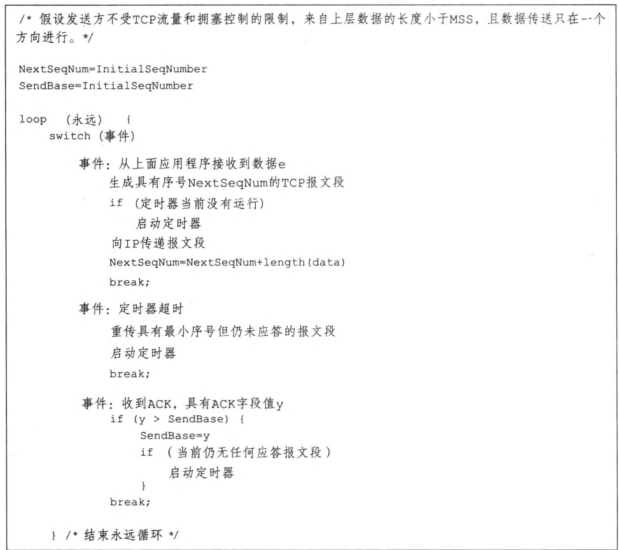实现 TCP 协议中的发送器 TCPSender 。
TCP 通过累积确认的方式来标记哪些段不需要跟踪了,发送方收到了一个 ackno ,表示接收方已经接收了 ackno 之前的所有数据。可以使用 queue 来跟踪没被确认的,一旦确认了就出队,同时也方便重传数据。
累积确认类似与 GBN(go back N)协议。在接收方 GBN 机制选择将待确认的全部丢弃了,在这次实验中 (Lab2), 选择了缓存这些待确认的,这类似与 SR(Selective Repeat)协议。
定时器机制
- 一段报文被发送时,定时器没有开启就开启,开启了就什么都不做。
- 定时器超时,这是就要重传还没有被确认的序号最小的段,同时,超时时间限制要扩大两倍,定时器重新计时。
- 收到一个合法的
ackno 时(严格大于已经被确认的最大的序号),定时器的超时时间限制回到初始值,并且不再跟踪已经确认的段,如果还有跟踪的段,开启定时器。

如果一个段的一部分被确认了,这个段仍然被认为是没有被确认的,事实上,TCP的实现上可以认为它是被确认的。作为实验,这里简化了操作。
需要注意的是,第一次握手时发送的段只包含 SYN 不包含其他数据。
在 Lab3 中 我们有一个发送空段的函数 send_empty_segment 可以用来探测接收方容量窗口大小,但是在 Lab2 中,并没处理接收一个空段会怎样。
tcp_receiver.cc
1
2
3
4
5
6
7
8
9
10
| bool TCPReceiver::segment_received(const TCPSegment &seg) {
const uint64_t abs_seqno = unwrap(seg.header().seqno, _isn.value(), _pos);
const uint64_t index = abs_seqno + (issyn ? 1 : 0);
const bool received_empty_segment = abs_seqno == _pos && seg.length_in_sequence_space() == 0;
if (received_empty_segment) return true;
}
|
tcp_sender.hh
1
2
3
4
5
6
7
8
9
10
11
12
13
14
15
16
17
18
| class TCPSender {
private:
uint64_t _recv_ackno{0};
bool _syn_flag{false};
bool _fin_flag{false};
uint64_t _windows_size{0};
std::queue<TCPSegment> _segments_outstanding{};
uint64_t _timer{0};
uint64_t _timeout;
bool _time_running{false};
uint64_t _byte_in_flight{0};
uint64_t _consecutive_retransmissions{0};
|
tcp_sender.cc
1
2
3
4
5
6
7
8
9
10
11
12
13
14
15
16
17
18
19
20
21
22
23
24
25
26
27
28
29
30
31
32
33
34
35
36
37
38
39
40
41
42
43
44
45
46
47
48
49
50
51
52
53
54
55
56
57
58
59
60
61
62
63
64
65
66
67
68
69
70
71
72
73
74
75
76
77
78
79
80
81
82
83
84
85
86
87
88
89
90
91
92
93
94
95
96
97
98
99
100
101
102
103
104
105
106
107
| TCPSender::TCPSender(const size_t capacity, const uint16_t retx_timeout, const std::optional<WrappingInt32> fixed_isn)
: _isn(fixed_isn.value_or(WrappingInt32{random_device()()}))
, _initial_retransmission_timeout{retx_timeout}
, _stream(capacity)
, _timeout{retx_timeout} {}
uint64_t TCPSender::bytes_in_flight() const { return _byte_in_flight; }
void TCPSender::fill_window() {
if (!_syn_flag) {
TCPSegment seg{};
seg.header().syn = true;
send_segment(seg);
_syn_flag = true;
return;
}
const size_t win_size = _windows_size ? _windows_size : 1;
size_t remain_win{};
while ((remain_win = win_size - _next_seqno + _recv_ackno) > 0 && !_fin_flag) {
TCPSegment seg{};
const uint16_t length = std::min(TCPConfig::MAX_PAYLOAD_SIZE, remain_win);
std::string data = _stream.read(length);
seg.payload() = Buffer{std::move(data)};
const bool eof = _stream.eof() && seg.length_in_sequence_space() < win_size;
if (eof) {
seg.header().fin = true;
_fin_flag = true;
}
const bool empty_segment = seg.length_in_sequence_space() == 0;
if (empty_segment) return;
send_segment(seg);
}
}
bool TCPSender::ack_received(const WrappingInt32 ackno, const uint16_t window_size) {
const uint64_t abs_seqno = unwrap(ackno, _isn, _recv_ackno);
if (abs_seqno > _next_seqno) return false;
_windows_size = window_size;
if (abs_seqno <= _recv_ackno) return true;
_recv_ackno = abs_seqno;
_timeout = _initial_retransmission_timeout;
_consecutive_retransmissions = 0;
while (!_segments_outstanding.empty()) {
TCPSegment& seg = _segments_outstanding.front();
const bool ac_segments = unwrap(seg.header().seqno, _isn, _recv_ackno)
+ seg.length_in_sequence_space() <= abs_seqno;
if (ac_segments) {
_byte_in_flight -= seg.length_in_sequence_space();
_segments_outstanding.pop();
} else break;
}
fill_window();
if (!_segments_outstanding.empty()) {
_time_running = true;
_timer = 0;
}
return true;
}
void TCPSender::tick(const size_t ms_since_last_tick) {
_timer += ms_since_last_tick;
const bool timeout_resend = _timer >= _timeout && !_segments_outstanding.empty();
if (timeout_resend) {
_segments_out.push(_segments_outstanding.front());
_consecutive_retransmissions++;
_timeout *= 2;
_time_running = true;
_timer = 0;
}
if (_segments_outstanding.empty()) {
_time_running = false;
}
}
unsigned int TCPSender::consecutive_retransmissions() const { return _consecutive_retransmissions; }
void TCPSender::send_empty_segment() {
TCPSegment res{};
res.header().seqno = wrap(_next_seqno, _isn);
_segments_out.push(res);
}
void TCPSender::send_segment(TCPSegment& seg) {
seg.header().seqno = wrap(_next_seqno, _isn);
_next_seqno += seg.length_in_sequence_space();
_byte_in_flight += seg.length_in_sequence_space();
_segments_out.push(seg);
_segments_outstanding.push(seg);
if (!_time_running) {
_time_running = true;
_timer = 0;
}
}
|
